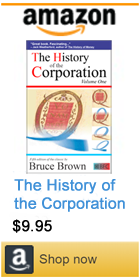|
At times corporations function commercially, at other times governmentally or religiously. Even among farmers, the last American bastion of individualism and family enterprise, the corporation has made great inroads. Many family farms are now structured as corporations for tax purposes, and in the richest portions of the nation's greatest agricultural producer, California, corporate farming has predominated since the 1970s.
Because the most powerful American corporations are of recent origin, it is easy to think of the corporation as a modern phenomenon, but actually they are very ancient -- so ancient that their actual point of origin is lost in legend of Numa Pompilius and beyond. The oldest surviving business corporation in the world is probably Sweden's Stora Kopperberg, which was founded in 1288 and is now known as StoraEnso. The oldest surviving corporation of any sort is the Benedictine Order of the Catholic Church, which was founded around 529 A.D.
Many aspects of modern corporate life are actually artifacts of the ancient past. The first corporate convention on record, for instance, was held by the Cistercian monks in the early 12th century. Even the pants that modern business executives wear -- either figuratively or literally -- are derived from the dress of Venetian corporados who adopted the customs of the Moslem East, scandalizing sixteenth century Europe and giving birth to the comic Venetian businessman, Pantalone, in Italian commedia dell' arte.
Similarly, former U.S. Treasury Secretary William Simon and associates were employing a hoary gambit when they bought the Gibson Greeting Card division of RCA in 1982 with $1 million of their own money, and $79 million borrowed against Gibson Greeting's own assets. Upon selling Gibson Greeting eighteen months later, Simon reportedly pocketed $66 million on an investment of $330,000. For awhile -- before the fall of Drexel Burnham Lambert and the others dragged down by leveraged buyout (LBO) debt - it seemed like LBOs might remake the American financial landscape.
In those heady days, a great deal was written about this marvelous advance in modern corporate practice. Actually, however, there are records of LBOs as far back as the thirteenth century when the Dominican bishop Thomas of Cantimpre complained of the ill effects of borrowing against the assets of a corporation to acquire control of it. "I am ashamed to record what I have seen," he wrote. "The abbot of this house [Anchin], who scarce knew the first elements of spiritual rule, attained to the elevation ... at so great an expense of money that he left his abbey in debt to the extent of more than 10,000 lire."
In addition to LBOs, the merchant guildsmen of Renaissance Italy employed compound interest, double entry bookkeeping, sinking funds, and expense accounts. Even the word company reflects actuarial refinement. It is derived from the French, com panis, meaning "with bread." This referred to a common device employed to dodge medieval usury laws; namely that a passive investor shared the risk of the venture as if he was a member of the family -- i.e., "shared the bread" -- of the people actively involved in the business, and therefore had "earned" his usurious interest or dividend.
While the etymology of company stresses the illicit aspects of the corporation, the word corporation itself stresses the higher aspirations of the entity. Derived from the Latin corparæ, it means to make corporal, or physically embody. For the first half millennia after the fall of Rome, the world's most powerful corporations were all trying to embody the Christian God. The idea took hold so strongly that by 1534 St. Thomas More could speak of Jesus Christ as the ultimate corporation: "He [Jesus] doth...incorporate all christen folke and hys owne bodye together in one corporacyon mistical."
A century later, Roger Williams, Freethinker and founder of Rhode Island, likened the church to a "company of East India or Turkey merchants," while English philosopher Thomas Hobbes saw those same joint stock companies as lesser -- possibly parasitic -- creatures within the larger creature of the state. In Leviathan he wrote, "Corporations... are many lesser commonwealths in the bowels of a greater, like worms in the entrails of a natural man."
God, demon, servant, master, parasite or provider -- what exactly is the corporation? A good starting point is probably...
"The History of the Corporation, Volume One" © Copyright 2003 Bruce Brown
Jacket illustration and design by Running Dog.
This is a free excerpt from The History of the Corporation by Bruce Brown.
The complete book is now available for Kindle on Amazon...

Key words from the remainder of the Introduction of
The History of the Corporation, Volume One
Chief Justice John Marshall
1819 Dartmouth College case
St. Benedict
Michael Milken
W. David Kubiak
Roger Manwood
1592
Edward Coke
628 A.D.
franchise
1978
Ronald Reagan
hereditary aristocracy
ancien regime
Black Death
Knights of the Hospital of St. John
French Revolution
Abbey of Cluny
Hotel de Cluny
Walter Rathenau
Allgemeine Elektrizitatsgesellschaft
1916
Pygmalion and Galatea
Totila
St. Francis
Marco Polo,
Savonarola,
Lorenzo de' Medici,
Mynheer Dirckszoon,
John Law,
Jay Cook,
T. Boone Pickens,
Mother Teresa
© Copyright 1973 - 2020 by Bruce Brown and BF Communications Inc.
Astonisher and Astonisher.com are trademarks of BF Communications Inc.
BF Communications Inc.
P.O. Box 393
Sumas, WA 98295 USA
(360) 927-3234
Website by Running Dog  |